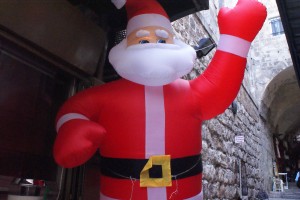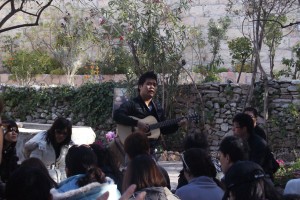The ghost of Christmas past in the Holy Land
By Khaled Diab
The Holy Land is where Christmas began. But with the relative decline of Christianity there, does the yuletide still retain its spirit?
Wednesday 28 December 2011

In one of the bizarre contrasts I've grown to associate with Jerusalem, one of the first signs of the approach of Christmas was actually an unintentionally symbolic juxtaposition of birth and death: a kitsch inflatable version of the legendary gift bearer Father Christmas (Santa Claus) watching over pilgrims – and shoppers – as they progress along the sombre Via Dolorosa (Way of Grief), the route Jesus is believed to have followed on the way to his crucifixion.
In the land that quite literally put the Christ into Christmas, the run-up to the holiday season in the public sphere is pretty low key, given that the majority of the population is either Jewish or Muslim. “You see some decoration around, but Christmas here is a normal time of year,” says Dimitri Karkar, a Palestinian Christian businessman. Karkar lives in Ramallah, which has grown, with the influx of refugees from other parts of historic Palestine and Israel's continued annexation of East Jerusalem, from being a small Christian village to become the de facto administrative capital of Palestine, where about a quarter of its population today is Christian.
This demographic reality inevitably affects the spirit of the season. “On Christmas Day, the majority of people are working, so most Christians work too,” notes Karkar, although he does point out that Orthodox Christmas, which is on 7 January, has been made a public holiday for Christians and Muslims alike in the West Bank. “My wife and kids are travelling but I have to keep my restaurant open.”
Although there is not much sign of Christmas in the public sphere in either Israel or Palestine, in private, the spirit of the season is alive and well. “I most enjoy the family gatherings,” Ameer Sader, a young Christian from Haifa, one of the major Arab population centres in Israel which is notable for its relatively good track record of coexistence. “The colours make me cheerful and full of holiday spirit.”
The way Christmas sheepishly sneaks up on you in Israel and Palestine sits in sharp contrast with the all-pervasive festive cheer in Europe and the United States. “Christmas here feels spiritless and meaningless in comparison to the West,” reflects Sader, who teaches English and works as a young guide at the National Museum of Science and Technology. “I've had the opportunity to celebrate Christmas in Paris. I felt the religious meaning of Christmas for two weeks long, as the midnight mass was an integral part of Christmas and the highlight of the celebrations,” he adds, while stressing that he is not a religious person.
With church attendance at an all-time low in Western Europe and the near-comprehensive secularisation of the festival in recent decades, Sader's idealised description of Christmas in Paris would come as something of a revelation to many Europeans, who spend much of the advent period making offerings for their loved ones at the altar of consumerism, while the “spirit” of the season tends to be a merry genie inside a bottle shared with family and friends.
For their part, foreign Christians and pilgrims tend to romanticise the “purity” of Christmas in the Holy Land. “Christmas here is fantastic because there's absolutely no sign of the trappings of materialism,” believes Richard Meryon, who is the director of Jerusalem's Garden Tomb, which is in a kind of spiritual territorial dispute with the Church of the nearby Holy Sepulchre due to its claim to be a strong candidate for the location of the crucifixion, burial and resurrection of Jesus.
“People in England hardly know the difference between Santa Claus and Jesus,” jokes Meryon, who has something of the quintessential English vicar about him, while a group of Singaporean pilgrims sing melodic hymns in the background. “Commercialism has taken Jesus out of Christmas.”

And the guitar-strumming young Singaporean who had led his evangelist group of pilgrims in song seemed to share Meryon's sentiments. “Being here is incredible. I can see Jesus all around me,” he said, I imagine, figuratively. Lacking any semblance of religious faith and not being of a spiritual disposition, in all my time in Jerusalem, I have never seen Christ figuratively. I have, however, repeatedly spotted a pilgrim fitting his description making his lonely way through the old city.
The reality of Christmas here seems to me to lie somewhere in the middle between what Sader and Meryon describe. In a land where people are generally more religious than in the West – whether they be Christians, Muslims or Jews – church attendance is high.
For obvious reasons, Bethlehem, whose population today is still about half Christian, is a popular pull for local Christians and pilgrims alike, with the highlight for the faithful being the midnight mass at the Church of the Nativity on Christmas Eve. And like for Joseph and Mary, those who leave it too long to book find that there's no more room at the inn. “I just enjoy the whole atmosphere of worshipping in the place where Jesus was born, but it doesn't look like a smelly cave with a manger and cows and cow poo,” says Meryon.
Despite the greater spirituality and religiosity, consumerism has been making rapid gains in Palestinian society, as reflected, for instance, by the ostentatious nature of weddings, which can last days and consume vast quantities of fireworks. In his grandparents' day things were different, says Sader. “People back then couldn't afford the extravagance which we are witnessing nowadays,” he explains, recalling his grandmother's stories of how she and her sisters would spend days making new clothes for the children and baking Christmas cakes.
Back then, the Holy Land was far more Christian that it is now. During the British mandate, Christians comprised nearly 10% of the population of Palestine in 1922 and around 8% in 1946. Today, Christians make up about 4% of the West Bank's population, although there are still a few Christian-majority villages about, such as Taybeh, whose skyline is dominated by church spires and produces the only Palestinian beer. Meanwhile, in Israel, though Christians make up 10% of its Palestinian population, they only constitute 2.5% of the total population. In Gaza, the Christian minority is even smaller, representing just 1% of the population.
A variety of push and pull factors are behind this relative decline. One major push factor is the Israeli-Palestinian conflict. The Arab-Israeli war of 1948 caused hundreds of thousands of Palestinians to flee or be driven out of their homes, most never to return – and each subsequent war has led to more Palestinians leaving. Today, though Palestinians are often materially better off than other Arabs, restrictions on movement, lack of economic opportunity, unemployment and the constant indignity of living under occupation prompt many to seek out new homes.
And being relatively better educated and sharing a common religion with the West, Palestinian Christians have generally been better placed to make the move. “Many Christians prioritise their religion over their nationality, thus feeling at home in western Christian countries as immigrants,” says Sader. “Also, the fertility rate among Christians is the lowest within Israel and Palestine, playing a role, however small it is, in their decline.”
But it would be a mistake to see this as a predominantly Christian phenomenon. “What is often ignored is the huge number of young Muslims who are leaving. And don't forget there are more Palestinian Muslims living abroad than Christians,” points out Karkar.
Paradoxically, Christian charities and missionaries, who often do valuable work here, have played an unwitting role in this dynamic. “I think that an awful lot of well-meaning Christians in the West, whether they are in America, Britain or other places, have poured a lot of money into the West Bank, and specifically into the churches and ministries here,” observes Meryon. This, he notes, “is causing a haemorrhaging of Palestinian believers”, although, as a counterbalance, the numbers of foreign believers and Messianic Jews who believe in Jesus are rising, he points out.
Of course, not all Christian activity has been “well-meaning” towards Palestinian Christians. For example, so-called Zionist Christians are passionately, even virulently, pro-Israeli, and many come to the Holy Land, including mounted on Harley Davidsons, to express their support.
This undermining role was rhetorically summed up by Republican presidential contender Newt Gingrich, who in an apparent bid to court the Christian Zionist and pro-Israel right, made the outrageous claim that “We have invented the Palestinian people”, as if the Palestinians I encounter every day here are a figments of my imagination created in a Hollywood basement somewhere.
Nevertheless, Palestinian Christians in Palestine and Israel I have met insist that, although they may face a certain amount of discrimination from the country's two major faith groups, especially with the rising tide of Islamic and Jewish fundamentalism, they are by no means “persecuted”. “Being a minority inside a minority is not a healthy and helpful situation,” contends Sader. “Christians feel rejected by their Muslim brothers (and vice versa) and of course by non-Arabs in the country.”
“There is no Islamic persecution here,” insists Karkar, who points out that it was a Muslim, the late Yasser Arafat, who not only symbolised national unity by marrying a Christian but also restored the status of Christmas in Bethlehem after years of Israeli-imposed isolation had made it impossible for Palestinian Christians from other parts to visit the birthplace of Christ. Karkar also contends that even the Islamist movement, Hamas, is not “anti-Christian”.
And in light of the pride Palestinian Christians hold in having produced some of Palestine's most notable political and intellectual luminaries, Karkar's assertionis understandable, especially given the traditionally secular nature of the Palestinian struggle for statehood. However, the recent rise of Islamism, although it may not have yet led to outright persecution, has certainly made Christians grow more uncomfortable as they are viewed with greater suspicion.
This discourse of “national unity” notwithstanding, not all is well in communal relations between Muslims and Christians. This is manifested in the growing significance of religious identity politics, as reflected, for example, in the increasingly overt displays of religious dress and the regularity with which I get asked whether I'm a Copt or a Muslim.
The future health of Christians and Christianity in the Holy Land will depend largely on politics and whether Israelis and Palestinians will be able to find a just resolution to their conflict. If peace and justice reign, many diaspora Palestinian Christians may be encouraged to return and help build a brighter and more inclusive future for all.
This is the extended version of an article that appeared in Salon on 23 December 2011.


